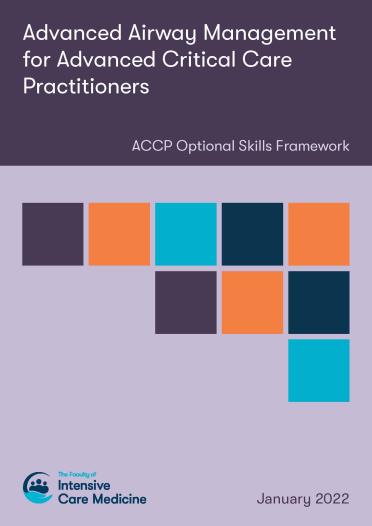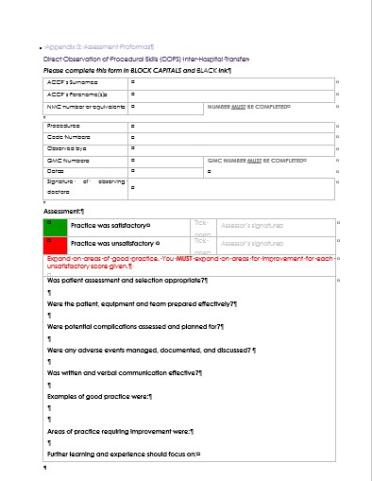ACCP AASF: Advanced Airway Management
The Faculty works with appropriate partner organisations to develop Additional Advanced Skills Framework Modules (AASFs) for Advanced Critical Care Practitioners (ACCPs) to undertake applicable to local patient need/ACCP development. In the case of this AASF, the FICM ACCP Sub-Committee acknowledge and thank the input and expertise from the Royal College of Anaesthetists (RCoA), Difficult Airway Society (DAS), and Association of Anaesthetists (AoA) in forming this document.
Background
Since their introduction, the role of Advanced Critical Care Practitioners (ACCPs) has developed over time. Airway management is already part of core ACCP training. Advanced Airway Management for the purposes of this document is defined as Rapid Sequence Intubation (RSI) for emergency intubations in the critically ill, which is the insertion of a cuffed Endotracheal (ET) tube following induction of anaesthesia. Advanced Airway management is a key part of ICM Medical training. Training established ACCPs in Advanced Airway management would allow ACCPs to provide immediate resident ICU advanced airway support as defined in GPICS Edition 2 (Medical staffing standards 2.1:5), provide added safety during ACCP led intra and inter-hospital patient transfers as well as facilitating airway procedures in a busy Critical Care department including planned intubation and airway management during percutaneous tracheostomy.
Development
The Advanced Airway Management AASF module and its associated competencies have been developed for the training of ACCP’s who have completed core training and hold FICM Membership as an ACCP. It is important to note that for the purposes of this document Advanced Airway skills for ACCPs would equate to core anaesthetic skills for anaesthetic trainees. Advanced airway management should be seen as an optional additional skill for ACCPs who wish to develop an enhanced role and where there is a clearly identified local service need, These competencies are based on the Airway Management curriculum of the Faculty of Intensive Care Medicine (FICM) 2019 Edition 5 version 2.4 and the Curriculum for a CCT in Anaesthesia published by the Royal College of Anaesthetists (RCoA) 2020 for core & intermediate level training, and have been adapted for use by non-anaesthetic practitioners working predominantly within a Critical Care environment. At present this is not part of the requirements for FICM core ACCP training.
Aims
The aims of this Advanced Critical Care Practitioner (ACCP) Advanced Airway Competency are to:
- Enable ACCP training to a nationally agreed standard by a FICM Additional Advanced Skills Framework (AASF) for Advanced Airway Management.
- Able to predict difficulty with an airway and obtain appropriate help in a timely manner.
- Able to maintain an airway and provide definitive airway management as part of emergency resuscitation.
- Demonstrate the use and interpretation of waveform capnography.
- Demonstrate safe management of the failed intubation scenario to correctly identify tracheal and oesophageal intubation.
- Demonstrate knowledge and understanding of DAS guidelines for critically ill patients.
- Demonstrate safe management of the 'cannot intubate cannot oxygenate' scenario.
- Able to provide skilled assistance during planned airway procedures in Critical Care including intubation, bronchoscopy and percutaneous tracheostomy.
- To describe the core theoretical knowledge, practical skills and professional judgment required of an ACCP in the context of advanced airway management.
- The competences identify knowledge, common and specialist elements, which are deemed essential to the role to meet service needs.
- Each individual practitioner will take professional responsibility for their autonomous practice including acknowledgement of their limitations and when to ‘refer the patient on’ to medical colleagues or other appropriate professionals. The responsibility lies with the ICU consultant, clarification of who the Airway team lead is where the ACCP is working with a junior doctor should be clarified in local policies and ACCP Standard operating procedures.
Want to know more?
Browse our ACCP pages.


